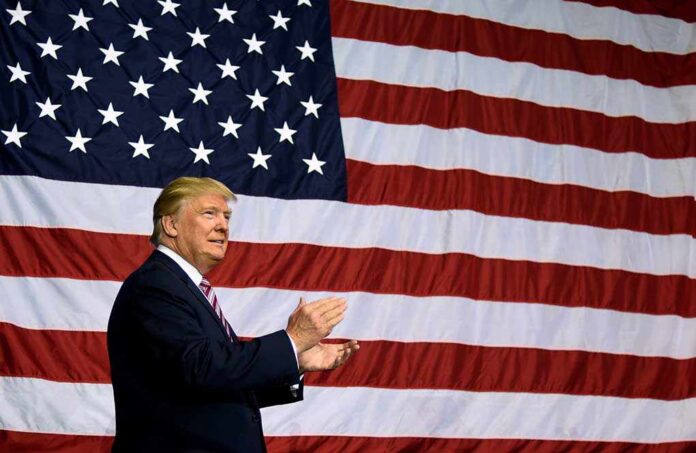Donald Trump’s recent shift towards a more moderate public persona has left political observers questioning whether this represents a genuine transformation or a calculated strategy to broaden his appeal.
At a Glance
- Trump is attempting to soften his tone and appear more moderate as he eyes further political leadership
- Recent interviews show a more focused and substantive approach, aiming to appeal to a broader audience
- Trump has made statements that can be interpreted in multiple ways, maintaining ambiguity in his positions
- There is speculation whether this is a new, more disciplined Trump or simply a rebranded version of his previous self
- Trump’s personality traits indicate a potentially combustible leadership style, characterized by bold and aggressive decisions
Trump’s Strategic Shift: A New Approach or Calculated Move?
As Donald Trump positions himself for potential future political leadership, a noticeable shift in his public demeanor has caught the attention of both supporters and critics alike. The former president, known for his fiery rhetoric and combative style, appears to be making a conscious effort to refine his approach and extend his reach to a wider audience.
During a recent “Meet the Press” interview, Trump exemplified this attempt at moderation by adopting a more conciliatory tone. He expressed a desire to represent those who did not vote for him, a stark contrast to his previous “American carnage” rhetoric. This shift in tone has led some to speculate about a possible transformation in Trump’s leadership style.
Balancing Act: Moderation vs. Combative Rhetoric
Despite efforts to present a more moderate image, Trump occasionally reverts to his previous, more combative style. This duality was evident when he criticized members of the House Jan. 6 Committee, calling for their imprisonment—a move that drew widespread criticism. These moments of reversion raise questions about the authenticity of Trump’s new approach.
Tom Griffin’s observation, made during Trump’s negotiations for the Menie Estate in Scotland, underscores the theatrical nature of Trump’s public persona. This theatricality continues to be a defining characteristic of his political strategy, even as he attempts to moderate his image.
The Psychology Behind Trump’s Leadership Style
To understand Trump’s current strategy, it’s crucial to examine his underlying personality traits. Psychologists have used the Big Five personality model to analyze Trump, characterizing him by high extroversion and low agreeableness—a rare combination for a presidential candidate. This unique blend of traits contributes to his charismatic yet often controversial leadership style.
Mark Singer’s provocative description of Trump, while subjective, highlights the complexity of Trump’s public persona and the challenges in discerning his true motivations. This complexity is at the heart of the current debate over whether Trump’s moderation is genuine or strategic.
Implications for Future Political Leadership
As Trump eyes potential future political roles, his strategic shift raises important questions about the nature of political leadership in America. Will this more moderate approach resonate with a broader base of voters? Or will his core supporters prefer the more combative style they’ve come to expect?
Regardless of the authenticity of this shift, Trump’s ability to adapt his public persona demonstrates his political acumen. Whether this represents a genuine transformation or a calculated maneuver, it’s clear that Trump continues to be a dominant force in shaping the political landscape.
Sources:
- https://www.nytimes.com/2024/11/17/us/politics/trump-signals-a-seismic-shift-shocking-the-washington-establishment.html
- https://www.theatlantic.com/magazine/archive/2016/06/the-mind-of-donald-trump/480771/
- https://www.foxnews.com/politics/kinder-gentler-trump-president-elect-taking-more-moderate-stance











